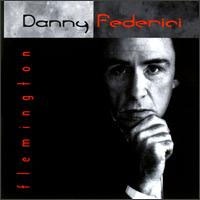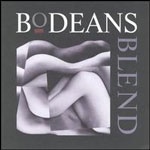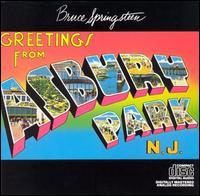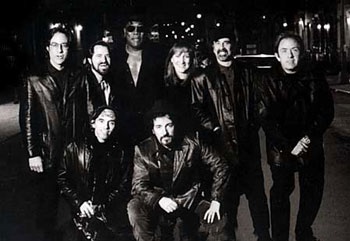Features
Danny Federici of The E Street Band: The Daily Vault Interview
by Jason Warburg
Danny Federici is a happy man -- and he's earned it.
After spending much of the last twenty-five years as an integral part of one of the great concert units in rock and roll history -- Bruce Springsteen's E Street Band -- Federici is on the brink of a new career, with a posse of old friends still lined up at his side. Almost a decade after Springsteen walked away from the band, this E Streeter is busier than ever, building his own record label and promoting his very first solo album.
The album, Flemington, is named after the New Jersey town he grew up in, but that's about as close as it gets to the Jersey shore sound popularized by his old Boss. The album is essentially contemporary jazz, a smooth blend of Latin, soul and jazz fusion influences, shot through with Federici's trademark keyboard and accordion playing. He throws in a few familiar touches for good measure -- a little organ-glockenspiel interplay on the title tune, and brief guest appearances by E Street Band bassist Garry Tallent and guitarist Nils Lofgren -- but the sound is distinctly Federici's, a fact he is justifiably proud of.
In the course of a long conversation over the phone one recent evening, we talked about Federici's new perspective as a bandleader and record label owner, his plans for promoting and touring behind Flemington, and the ever-constant speculation about the possibilities for an E Street Band reunion.
Daily Vault: You've been a member of the E Street Band and a session player your whole career up until now. After thirty years in the music business, what led you down the road to want to do a solo album?
Danny Federici: It was something I never really thought about; that's why it came out so late in my career. I had written a lot of music for film and TV for many years, I'd studied classical accordion. I actually used to always write my own music and stuff all the time, before I hooked up with Bruce. It's something that's always been with me. It just didn't all come together until recently.Part of what finally led to doing an album was that I'd listen to the kind of music I like to listen to, which is mostly contemporary jazz, on stations like The Wave in LA and 101.9 in New York, and think to myself, "How'd that get on the radio? I could do better than that." So eventually I had to try and actually do it.I think this music I'm involved in crosses all barriers. I had some stuff to start with that I really liked. And then I'd give out tapes to my friends and kind of say "Hey, what do you think about this?" And Bruce and the band and my partners at Deadeye Records, all my friends heard it, and pretty much all of them said "Hey, let's do this, you need to get this out there." And that was a great feeling, having that kind of validation from my peers, my buddies, the guys whose opinions mean the most to me. Bruce was very surprised by the music. I think he didn't know what to expect. But his reaction made me feel really good.

What was it like in the studio, going from being one of the guys in the band to being the guy in charge -- the songwriter, the producer and the bandleader?
Actually, the thing I liked the most about it was being in a position to make sure I got all the proper credit. In the early days, a lot of things went on in the studio where I did things and nobody really paid attention, so I ended up not getting credited for accordion, or background vocals, or whatever on songs. People just forgot to put it all down for the credits. And so it's neat to be able to put myself down for everything I did on the record -- you know, I played all the keyboards, the accordion, produced the album and co-engineered it. And I wrote all the songs and all the parts. I didn't just come up with a melody and then bring it to the players and say, "Here's my song, what do you want to do with it?" I wrote all the bass parts and everything else and then had people come in and play them. The whole process helped me see I can trust myself. I was never sure until people came in if I'd done it right, and then I realized it would only sound right if they played the way I'd written it.Toward the end I was editing my ass off. I'd change something and have my partners at Deadeye listen, and they'd say "It's fine, it's fine," and I'd have my wife listen and she'd say "I can't hear anything different," but I always heard a way to improve it -- until we reached a certain point where I just had to say, okay, that's it. We're done.
How did you end up starting your own label, getting into that side of things?
I have a music publishing company, Shark River Music. And I advertise in a couple of papers and get a lot of people sending me music. Eventually I got to the point where I felt like I didn't have time to develop the talent, but if people had their product already ready, with good songs and artwork and a sample pressing of CDs and everything ready to go, but they couldn't get a record deal, then I would consider taking a listen to it, because I know how hard it is and how much belief you have to have in yourself to get your music out there. There a lot of people out there with a thousand CDs they paid to have made themselves sitting in their closet because they can't get any backing. My original idea was to have a record company with a web site, so that I could just get it out there.
Is the web site one of your main distribution outlets?
No. At first I thought it might be, but we ended up signing a deal with a company called Music Masters back in New Jersey to get distribution through BMG. And that got me into Tower and Blockbuster and Virgin. We're not talking huge numbers of CDs, but we're in all those stores, all over the country, and that's great.
Back to the album a little bit -- it's got a real smooth, confident feel. You've got a couple of old friends on there, Garry Tallent and Nils Lofgren. Did that help your comfort level, having some familiar faces there in the studio?
I actually sent the tape to Garry and he did his parts in Nashville and then sent the tape back.
Well, there goes my image of you guys in the studio! (Laughter)
Yeah. But Nils, he was in town directing the music on the ACE awards. He's done that for something like three years in a row. And in his case, guitar is only instrument I'm really not familiar with. So we talked about it a little off and on, and then he came by the studio and said hello, and then he's like "Hey, let's try something out." And in the end it took him about 20 minutes, and I couldn't be more pleased with it. The stuff he played just fit in perfectly.
Yeah, those were very nice little touches he added. Listening to the album, I heard a lot of different sources and styles in the music -- a little bit of Latin here, a little bit of contemporary jazz -- how would you describe it yourself?
Just the way you put it. With more time and more money I would like to have put more of the Latin feel in it. I just love that Latin sound. Some of the music you hear in the background on the album is Latin samples. I kept it in back so it wouldn't sound fake. My intention is to use a percussionist on the next album; I'm actually going crazy right now trying to find a percussionist. I can't get the sound I want with just a drummer; I need both a drummer and a percussionist. The accordion did bring some other influences in, too. Like on "Mr. Continental," the accordion gives it a very European feel, kind of a romantic touch.
That was actually a perfect segue -- you must have known what my next question was, because I was going to ask you about the stories on the Deadeye Records website about the accordion lessons your mom used to take you to.
It was just like the image you probably have. I was an unpopular, overweight kid going off to accordion lessons with my mother pulling me by the ear. At the time it was pretty miserable; I was this red haired freckle-faced accordion-playing kid. As I got older, I got more serious about not wanting to do it. But Mom was a stage mom. She stayed on me, worked me hard, made me practice all the time. I wasn't that great in school, but she didn't care -- she had other ideas for me. I was going to be a classical accordion player. If things had continued the way they were heading, I think today I'd be really good friends with Wayne Newton. (Laughter) She had me dressed up in these really schlocky clothes, playing classical music on the accordion. If nothing had changed, I'd be playing Vegas right now with Don Rickles and Frank Sinatra. Thank God the Beatles came along. Like everybody else, I got all excited about them, and right after that one day my accordion professor got sick and we had a substitute who played some jazz for us. Once I'd heard jazz played on the accordion, there was no going back. The music moved me so much I quit altogether about a year later. And to her credit, my mother was hip enough to respect my wishes.
Did you ever see yourself playing accordion in a rock and roll band? I was actually listening today to the BoDeans' "Heart of a Miracle," and the accordion you played on that song is just great, and it's a great rock and roll song.
Yeah. Accordion's a really unique instrument. When I play it today I still think of my mom all the time. It's changed a lot since I was a kid, though -- (laughs) here's a good story. I play part time out here with a zydeco band, and I was playing a couple of weeks ago in Santa Monica. I was standing there playing and these pretty girls walked by and sort of smiled at me, and I just naturally smiled back at them, and then I'm thinking to myself "Yeah, right, you're playing the accordion" -- but things have changed since I was a kid. Girls like the accordion now. When I was a kid -- well, that's why I picked up the organ! (Laughter) The girls were not going for the guy playing the squeeze box!


As long as we're on instruments, I'm curious -- who got the idea back in 1972 or 73 to put glockenspiel on a rock and roll record?
It was Bruce's idea to do it. He was heavily influenced by Phil Spector, you know. It's sort of ironic, because that influence ended up creating this whole Asbury Park sound with the organ and glockenspiel playing off each other.
You mentioned a couple of stations you like -- how has radio responded to the album? Are the contemporary jazz stations picking it up?
We're getting played -- (stops and laughs) you know, I'm really having a hard time getting used to not being in a band where it's "We this" and "We that." I'm getting played on about 70 radio stations nationally. There are only a couple of hundred stations in the contemporary jazz market, so that's not too bad. When I put this record out I didn't think too hard about what songs would fit the kind of radio that plays the style that I was writing in. I didn't have any real commercial intentions. I just really needed to put this record out. Once I put it out my job is basically over; what happens from there, happens.I've got a good story for you, though. A little while back I called Max Weinberg and said "Hey, Max, can you do an old pal a favor? Can you get me on the show," -- you know, Late Night, with Conan -- "and play a couple of my songs with me?" So Max lines it all up so it can happen while I'm in New York doing a video shoot with Bruce. And I get out there on stage and Max's horn section in the Seven [the Max Weinberg Seven, the Late Night house band] is a bunch of the old gang that used to back up Bruce on the E Street albums [see Live 1975-85 and Chimes Of Freedom]. It's La Bamba [Richie "La Bamba" Rosenberg, one of the original members of Jersey shore legends the Asbury Jukes] and Mark Pender and those guys. It was such a great feeling, having these guys I've known for years and years behind me playing my songs. I mean, on the show I had that five-piece horn section right in my ear for three songs. And so afterwards I get to the video shoot and start telling Bruce about it. And I'm saying "Bruce, I gotta tell you it was soooo great having the horn section behind me playing my songs," and he was laughing with me, because he got it, you know? He got that it was something really special for me, having that band up there playing MY songs.
You were saying you're putting together a band to do some live dates. How's that coming together? Who's going to be in the band?
Michael Cates is this great sax player I know from New Jersey. We met a long time ago back there and then sort of lost touch, and then ended up crossing paths again. He actually found my web site address and then sent me some e-mail. Then I went to see him at the Long Beach Jazz Festival, and now he's in the band. Ben Arrington, my partner at Deadeye Records, is my bass player. And I've been playing with a couple of drummers and guitar players, doing a few local dates to try things out, but I'm not firm on who I want to keep yet. We've got some dates set toward the end of May in France, and something in Switzerland. We'll probably come back to the U.S. and do some stuff on east coast in May or June.
Who are some of your favorite musicians in the business, both folks you've had a chance to work with, and maybe folks who you haven't had the chance to work with yet, but you'd like to?
I like David Sanborn a lot; he's a great sax player, just terrific. I've always loved Jimmy Smith. And I've always wanted to play with Bruce Hornsby -- his style of piano playing is very rhythmic. This might surprise some people, but I'd love to play accordion with Garth Brooks. I've called his people before and said, "Hey, give me a call sometime." I haven't heard anything back, though.
You think Garry Tallent out there in Nashville has any Garth connections he could put to work for you on that?
I don't know. He probably does! I just haven't really pushed it.
That gets me to the question that all the Springsteen fans out there would crucify me if I failed to ask...
...is there going to be an E Street Band reunion? Is there going to be a tour? (Laughter)
Well, there you go.
You know, we talk about it all the time... but that's all we've been doing. A couple of years ago, I thought maybe it would happen, but it just didn't come about. I still play with Bruce all the time. I played on Ghost Of Tom Joad, "Dead Man Walkin'," the Jerry Maguire soundtrack. I just shot a video with Bruce in New York for Rolling Stone's "30 Years of Rock and Roll" special, playing accordion and organ. Bruce and I are better friends now then we've ever been, and that's great. I've got my own album out and I'm great friends with Bruce. I really couldn't ask for anything better.

Bruce Springsteen and The E Street Band 1995: Front: Nils Lofgren, Bruce Springsteen;
Standing: Max Weinberg, Garry Tallent, Clarence Clemons, Patti Scialfa, Roy Bittan, Danny Federici
One last sort of oddball question someone suggested to me that seemed interesting -- has anyone ever floated the idea of doing an E-Street Band album WITHOUT Bruce on it?
We've thought about it through the years. We played as the E Street Band at one of the inaugural balls in 1992, with Johnny Rivers and Southside Johnny. It was really a blast. But our problem with trying to do that is, who are you going to get to sing lead? Whoever it is, is going to get crucified. It's a very tricky thing to put somebody in that spot. I think the only thing you could even try would be to put a girl in that spot. But you know, the biggest problem is that we wouldn't have a boss. I wouldn't listen to Clarence, and Clarence wouldn't listen to Max, and Max wouldn't listen to me... none of us would listen to each other... but we would all listen to Bruce. He's always been great at that -- "You, play this. You, play that." "No, that's too much," or too little. With Bruce, we all know what our piece of the puzzle is. I don't think we could really work together without Bruce. That's what that whole band is about; he's our leader.
I appreciate you taking so much time with me, and best of luck with the album.
Thanks. These are getting easier!